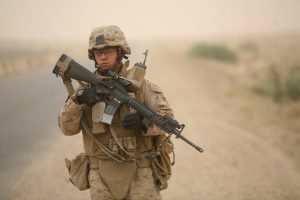
ANALYSIS By March 2023, 20 years have passed since the US invasion of Iraq, a revolutionary incident that led to a full-scale civil war that is partly ongoing to this day. Thus, it is time to go through the reasons for the invasion and the subsequent wars, what happened, and the current situation in the still war-torn region.
Through the epic terror attacks in New York on 9-11 2001, a new world order commenced, but the grounds for it was already laid with George W Bush’s victory in the presidential election in the fall of 2000. The two events would together shape a new global era, events with enormous consequences especially for the countries of the Middle East.
Basic doctrines to justify the invasion
The Iraq invasion had its theoretical base in the so-called Bush doctrine, a principle that was cemented long before the terror attacks on 9-11, and that in turn was based on the Carter Doctrine from 1980 which established the perceived right to use military means to protect US interests (oil etc) around the Persian Gulf. The doctrine can also be viewed as a response to the Soviet occupation of Afghanistan to hinder Soviet/Russian influence in the region.
The Carter Doctrine caused a paradigm shift in the foreign and defense policies of the US, a shift that would gradually turn focus towards the Middle East, and that would culminate in the 2003 invasion of Iraq. (The fact that merely no US soldiers had died in the Middle East during 1945-1990, and almost no US military personnel had died outside the Middle East from 1990 and onwards reveal this with all its brutal clarity.)
Unilateralism, spreading of democracy and preemptive strikes
The Bush Doctrine was mainly formed after 9-11 and contained three main pillars: unilateralism, spreading of democracy and preemptive strikes. It meant that The US gave itself the right to militarily act against countries that harbor terrorists or support terror groups, arguments that would be used for the invasion of Afghanistan in the fall of 2001.
The concept “Preemptive strikes” signifies that military attacks against other countries or groups in other countries could be justified in the claims of self-defense already before these had acted, a motive that was used against Iraq in 2003 when Saddam Hussein was accused of holding weapons of mass destruction.
Unilateralism furthermore included that the US justified to act militarily on its own to protect its interests, without asking the world community for permission and thus rounding international law.
An important part of the Bush Doctrine was the US’ support of democratic states around the world, and the intention to spread freedom and democracy through force, including military means. According to the neo-conservative doctrine, the hate against the West had not been created by the acting of the US, but by dictatorships in the Middle East with chaos-stricken societies in which Islamic terrorism has its roots. The solution would thereby be to democratize these states and to include them in the Western community with its democratic values and economic development.
Thus, it was the responsibility of the US to protect itself and its allies by promoting democracy in the countries where terrorists reside, and thereby undermine their activities. In other words, the purpose of intervention was, according to the US Minister of Defense, Donald Rumsfeld, “to change the way they live”.
Military resolve was the sheer foundation of global, American leadership during the Bush era, and the global war on terror following 9-11 was a symptom of that.
Mission Iraqi Freedom
The main goal of the invasion of Iraq was to significantly change the world, something that, according to the Bush administration, would need large-scale military adventures.
The military effort in Iraq was not large enough to necessitate a mobilization of the nation, to switch into so-called war economy. Americans shouldn’t have to make any sacrifices and the invasion, the epic change of the Middle East, would be executed through the existing military.
The US military would prove sufficient to quite easily overpower the Iraqi forces and overthrow Saddam Hussein, but it wasn’t strong or large enough to pacify the Iraqi society, to secure law and order. (To put this in perspective it should be mentioned that four times as many troops were used in the Vietnam war than in Iraq.)
When Saddam finally had succumbed in April 2003, the war was still not over – it had merely started. Quickly the Iraqi population would start viewing the “liberators” as occupants and already during April 2003 a first warning incident occurred: American troops killing 13 civilians that protested against the occupation force in Fallujah.
The US generals had no knowledge of how to pacify a whole country, a country larger than California, with porous borders and a fragmented population of 25 million.
One problem was that Iraqi civil servants that would have been able to maintain the societal functions had gone missing as the civilian institution responsible for governing Iraq following Saddam’s fall, abolished the Baath party and forbid all its members to continue their government employment. Moreover, the entire security apparatus including the Iraqi army was dismantled. Iraq became an empty shell, and the entire governing responsibility was laid upon a colossally under-staffed occupation force.
Armed resistance
When Saddam’s Sunni-led regime was toppled by the US in April 2003, Sunni rebel forces quickly emerged with entities of domestic and foreign jihadists including Al-Qaeda and Baathists with Sunnites related to Saddam’s former military and security services.
For a long time, the US generals as well as the Washington administration believed that the war was over once Saddam Hussein disappeared, and there was a lack of understanding of why it continued. The ever-increasing resistance was dismissed as unorganized criminal elements. As the US losses increased it was finally realized that the resistance in reality constituted of multifaceted, organized guerilla warfare and that the war was still ongoing.
It was gradually understood that Iraq during US occupation had become a magnet for terrorism. This meant that the occupation had a contradictory effect. Instead of decreasing international terrorism the US war had strengthened it.
Ruthless warfare on all sides
The warfare of the occupation forces in Iraq was strikingly ruthless and awakened an outrage in the United States as well as around the world. Respect for the rule of law, international law or human rights didn’t seem to exist. One tactical method of nightly raids was called “apprehend-detain-Interrogate”, where doors were kicked in and all men in the household were arrested, without any specific suspicion of terrorism or participation in militia activities.
It was all about finding terrorists and rebel fighters, or potential ones, through mass arrests. Rumsfeld’s words “sweep it all up, related to 9/11 and not” were consequently executed by the troops on the ground. Thousands Iraqi men were gathered in the prisons around the country, the most famous being the notorious Abu Ghraib a few miles West of Baghdad. In April 2004, serious abuse against prisoners like beatings, torture and different kinds of humiliation was revealed. The scandal had considerable consequences. It would create even worse hostility towards the United States, and the Iraqi men that were subject to the brutality of the US forces possibly became more easily recruited by the militias.
For Muslims all over the Middle East the picture of Americans as uncivilized, decadent and perverse were cemented. The Bush administration’s motive for the war, to free the people of the region, came to shame, and it became impossible to call oneself “liberator”. The slogan that Baghdad was the door opener to the entire Middle East had reached its end. George W Bush’s project of recasting the region had all but collapsed.
 Filip Ericsson has a master’s degree in Peace and Conflict Studies from Uppsala University. Early in his career he conducted an internship at UNDP in Sierra Leone, worked as coordinator at Johanniter International Assistance in Sudan and as a freelance journalist at The Daily Star Newspaper in Lebanon. Today Filip works with social welfare issues in Uppsala, is active as a freelance writer for different magazines and runs the blog https://varldspolitikifokus.wordpress.com/
Filip Ericsson has a master’s degree in Peace and Conflict Studies from Uppsala University. Early in his career he conducted an internship at UNDP in Sierra Leone, worked as coordinator at Johanniter International Assistance in Sudan and as a freelance journalist at The Daily Star Newspaper in Lebanon. Today Filip works with social welfare issues in Uppsala, is active as a freelance writer for different magazines and runs the blog https://varldspolitikifokus.wordpress.com/
Editor: Gerd Johnsson-Latham
SOURCES:
Andrew J. Bacevich, America’s War for the Greater Middle East, 2017, Random House Inc.
Brookings Institution, https://www.brookings.edu/research/operation-iraqi-freedom-and-the-future-of-the-u-s-military/
Institute for the study of war, http://www.understandingwar.org/report/beyond-islamic-state-iraqs-sunni-insurgency
Global Security, https://www.globalsecurity.org/military/world/war/iraq-civil-war-2014.htm
Defense One, https://www.defenseone.com/threats/2018/03/war-iraq-isnt-done-commanders-explain-why-and-whats-next/146889/
International Crisis group, https://www.crisisgroup.org/middle-east-north-africa/gulf-and-arabian-peninsula/iraq/b61-how-cope-iraqs-summer-brushfire
International Crisis Group, https://www.crisisgroup.org/middle-east-north-africa/gulf-and-arabian-peninsula/iraq/188-iraqs-paramilitary-groups-challenge-rebuilding-functioning-state
Utrikespolitiska Institutet, https://www.utrikesmagasinet.se/analyser/2018/oktober/isis-a-longer-view
Human Rights Watch, https://www.hrw.org/world-report/2018/country-chapters/iraq
Journalist’s resource, https://journalistsresource.org/studies/international/conflicts/crisis-iraq-perspectives-research
The Independent, https://www.independent.co.uk/voices/syria-iraq-isis-yemen-saudi-arabia-iran-trump-wars-coming-to-an-end-a8133356.html
BBC, https://www.bbc.com/news/world-middle-east-14546763
Foreign Policy Magazine, Why Muqtada al-Sadr Failed to Reform Iraq, (foreignpolicy.com)
Al Jazeera, Muqtada al-Sadr: Iraq’s kingmaker in uncertain times | Politics News | Al Jazeera
untitled (belfercenter.org), “Testing the Surge: Why Did Violence Decline in Iraq in 2007?”

Lämna ett svar